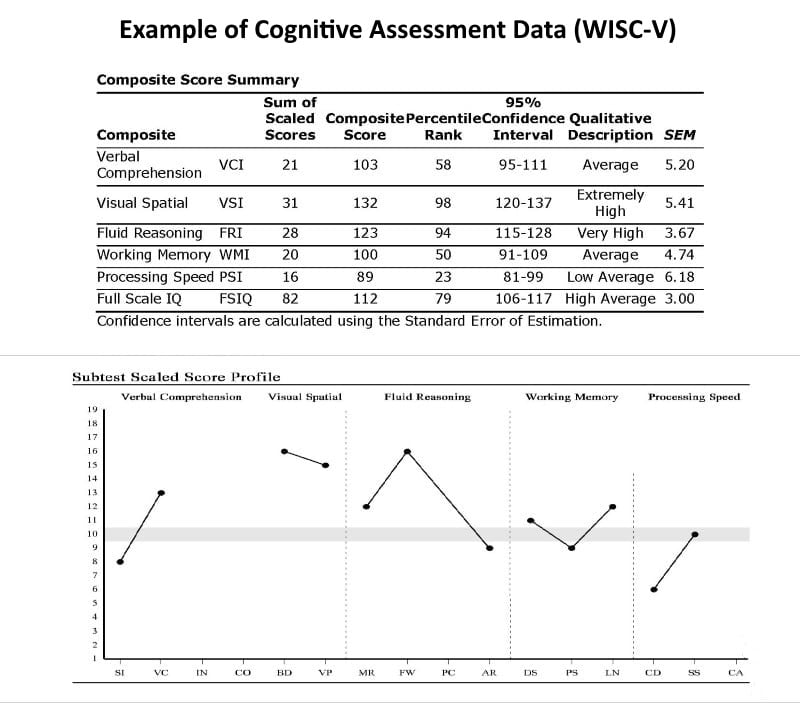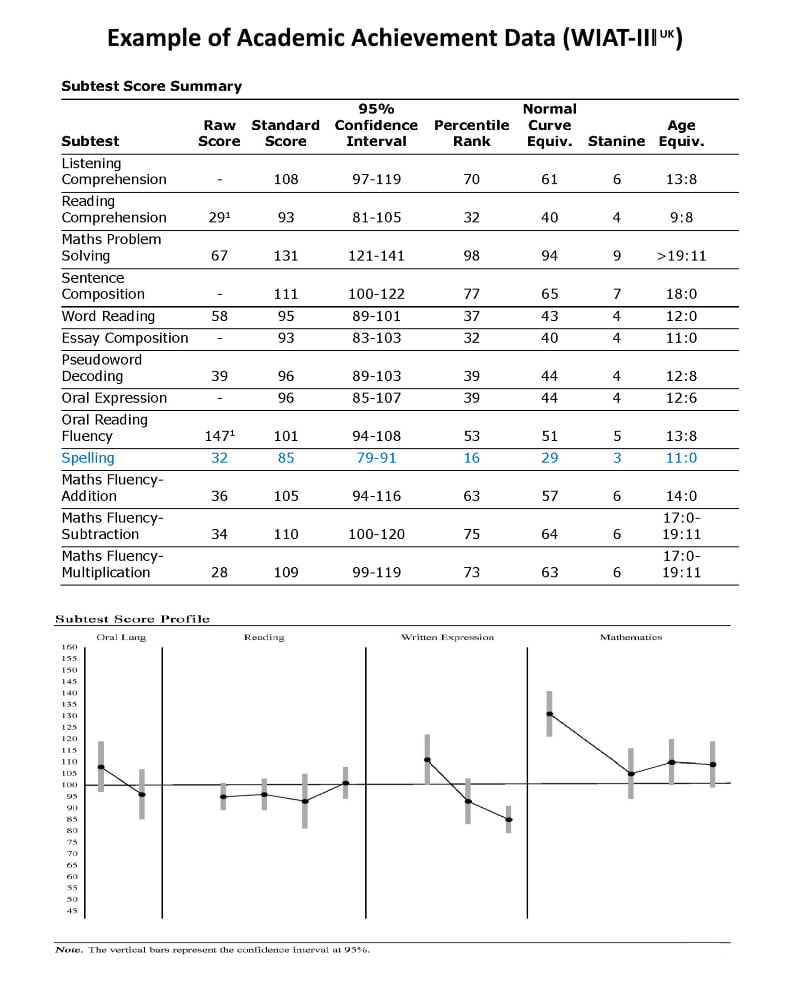By World Family Education with Brad and Joyce Trottman
Children who learn in significantly different ways can have difficulty in school whether they are behind or ahead of their peers. If your child struggles with the learning process, you’ve probably wanted to know more about how your child learns and how to help them. Perhaps it’s difficult to communicate your concerns with teachers or to advocate for your child. The information you are looking for, which summarizes your child’s skills and behavior, is found in a learning profile. This profile is developed through the process of a psychoeducational assessment.
A learning profile is different from the information you get from the normal daily assessments used in the education process. For more about those, read the World Family Education page Assessments in Education: A Guide for Parents.
What is a Learning Profile?
This type of profile is a detailed description of the mental processes used in learning, as well as a child’s current academic levels. This assessment can be completed by either a clinical child psychologist or an educational psychologist. A clinical psychologist may be focused on how mental processes impact the child’s life in general (mental health), while an educational psychologist is specially trained to look at how these mental processes impact the child’s education, and may work within an education system. Either kind of psychologist can create a learning profile, but if your main concern is education, an educational psychologist would be an ideal choice. The psychologist will base the learning profile on the data gathered using a variety of psychological and educational assessment tools. With this profile, you can have a deeper understanding of what your child faces in the learning process, and it may also establish that your child is eligible to receive special education services for an area of disability or giftedness -or both (referred to as “twice exceptional”).
Signs that you should seek the help of an educational psychologist to develop your child’s learning profile include the following:
Before arranging an evaluation with a psychologist, make sure to rule out visual, hearing, speech, or physical issues by seeing a family physician, then perhaps an ophthalmologist, audiologist, speech and language pathologist or occupational therapist.
The Profile Process
Before the assessment, try to meet with the psychologist to make sure you understand as much as you can about the assessment process. Make sure you get a clear idea about what will be in the profile report and what the psychologist can or can’t diagnose. Also, be clear about the questions you want answered in the profile.
The psychologist will ask parents and sometimes teachers to complete a student information form. This form asks detailed and important questions about strengths, weaknesses, and concerns related to your child, such as developmental and academic history, and prior assessments or evaluations. This information will be the basis on which the psychologist determines what components will make up the assessment battery. (An “assessment battery” refers to a set of assessments grouped together.)
Once the psychologist and parent determine the need for an evaluation, they will schedule the assessment sessions and may send various rating scales (surveys) for parents and/or teachers to complete. The evaluation will usually be held over several days, for a few hours at a time. The child will be permitted to have breaks during the testing as needed. Keep your child’s safety in mind, as these sessions are one-on-one. Read more about Keeping Your Child Safe While Living Cross-Culturally.
The heart of the battery includes two types of assessment tools. The first tool measures certain mental (cognitive) processes and is often referred to as an IQ test. The other tool measures skill levels in certain academic tasks and is commonly known as an achievement test. Read more about each of them below.
Measuring Cognitive Processes
Some common cognitive assessment tools are the BAS3 (British Ability Scales), WRIT (Wide Range Intelligence Test), WJ-IV COG (Woodcock-Johnson Tests of Cognitive Ability), KABC-II (Kauffman Assessment Battery for Children), WISC-V (Wechsler Intelligence Scale for Children), and the WNV (Wechsler Non-Verbal Scale of Ability).
Processes measured may include:

Measuring Academic Tasks
Some common academic achievement tools are the WJ-IV (Woodcock-Johnson Tests of Achievement), WRAT 5 (Wide Range Achievement Test), KTEA-III (Kauffman Test of Educational Achievement), and the WIAT-IV (Wechsler Individual Achievement Test).
Academic areas that are measured may include:

The educational psychologist does not just look at the cognitive (IQ) scores, but compares the data from both the cognitive and academic achievement assessments. They will look for patterns, deviations, and extremes to create the basis of a learning profile. Often there is a mix of strengths along with any weaknesses, which can be a source of stress for a child.
As part of the assessment, the educational psychologist makes detailed observations of a child’s behavior during the assessment sessions and, if possible, in a home or school setting. Additionally, the psychologist may use other tools to dig deeper into areas of concern. Some of these tools are in the form of surveys (rating scales) that parents and teachers fill out regarding areas such as attention, executive functioning (plan, monitor, and execute goals), and behavioral, social, emotional, or developmental concerns. The psychologist may also work with a team to do other evaluations in speech, language, vision, hearing, and motor skills.
After the assessments are completed, the psychologist will gather and process the data, then prepare a report including the reason for the assessment, background information, scores, statistical analysis, conclusions, and recommendations. The parents will meet with the psychologist to review the results and recommendations.
A lot of information is contained in these reports (numbers, tables, charts, graphs, etc.), and parents may feel overwhelmed. While it may be tempting to focus on the IQ scores or just look for a summary of the findings, parents should take the time to ask questions about each of the assessment tools and the results of each. The more details parents know about their child’s learning, the better equipped they will be to assist and advocate for them.
Preparing Your Child for the Assessment
Before the assessment, you should communicate with your child about what to expect. Explain the reason for the assessment in an age-appropriate way, focusing on the positive outcome of knowing more about how your child learns. Your child needs to understand that this is not a pass or fail test, but rather a measure to get an accurate picture of their learning styles and abilities. Discuss what will happen during the sessions, including that they will be answering questions and doing activities in a room with a psychologist, but you will be close by and available. It is important that your child is calm, relaxed, and gives their best effort on the tasks. Be sure to schedule the appointments at a time of day when your child functions best, and make sure they have water, snacks, and a jacket for comfort if needed.
The Profile Conclusion
The purpose of a psychoeducational assessment is to uncover differences in your child’s learning process, including areas of strength and weakness. Using the process described above, an educational psychologist can identify specific learning disabilities (and giftedness) in areas such as reading, writing, math, etc. They can also identify learning style preferences, issues with executive functioning, and answer questions about behavioral, social, emotional, or developmental concerns.
When working with a team (speech/language pathologist, occupational therapist, etc.), a psychologist may also be able to identify more complex issues, including auditory processing disorders and autism spectrum disorder. Attention deficit/hyperactivity disorder (ADHD) is typically treated as a medical diagnosis, but using the same parent/teacher surveys that a medical doctor would use, an educational psychologist can usually determine if a child needs special support in that area.
Once areas of need are identified, the report will also make recommendations for meeting these needs. This is usually a list of specific interventions and accommodations to help the child experience more success in the learning process. It is important that parents understand these recommendations and give feedback to the psychologist. Sometimes a recommendation is made that is not realistic in a family’s situation, so this needs to be addressed and alternatives explored.
Naturally, a child will want to know the results of the assessment process. Parents can give an overview of the results in an age-appropriate way, with an emphasis on how it will help teachers. Typically, teenagers should be included in a discussion of the results with the educational psychologist.
Parents should be sure to share the report with their child’s school. Ideally, the school will develop a plan to implement the report’s recommendations. This plan is often referred to as an individualized education program (IEP).
Read more about this process at these World Family Education pages:
Finding the Best International School for Your Child with Special Needs
What If a School Doesn’t Have a Program for a Child with Special Needs?
Finding Assessment Options while Living Internationally
It may be possible to access assessment options within the school system of your home or host country. This would make the cost much lower than if you need to have it done through a private practice. The fees charged for assessments vary widely around the globe, but will be influenced by location, complexity of assessment, and whether it is a clinical or educational psychologist. You will likely be spending several thousand U.S. dollars for an assessment. Insurance plans may not cover this assessment, however your employer may be willing to help, and some psychologists may offer discounts depending on your situation. Keep in mind that finding the answers to the questions about your child’s learning will be well worth the investment.
If you are in a large city or in a modernized country, you may find good resources that may even be accessible through the national school system. However, you may find yourself in a location that has very few options.
Your first strategy to find resources may be web searches. World Family Education is collecting a growing number of resources found at the pages Special Needs Resources by Location and Family Counseling and Coaching. Connect with expat groups in your area (including home education groups), other parents, international schools, or your company to ask about recommendations for resources like child or educational psychologists. The International Therapist Directory may help you connect with a professional in your area that will have some good recommendations as well.
Ideally, you want an educational psychologist that is a native speaker of your child’s first language, has a good understanding of your educational system, and is experienced at giving recommendations for that system. Sometimes international schools have educational psychologists on staff, or there may be one in the expat community that could help you.
There have been some recent developments in remote (online) psychoeducational assessment. While still rare, more and more educational psychologists are able to use secure platforms and trained proctors to offer assessments in places where they were not available before.
If your best option is to work with a local psychologist, be sure to have a clear idea of what you need before you meet with them. If your school asks for documentation, find out exactly what they need to move forward with a learning plan. Be aware that in some countries, some psychologists are prepared to validate a “diagnosis” that parents or teachers have made, rather than go through the complete process objectively. This is not what you want. Also keep in mind that language and cultural differences can impact assessment results.
The qualifications needed to practice as a psychologist and administer these assessments can vary widely around the world, so try to find a local child or educational psychologist that has been trained in a country with a similar psychological and educational system to yours. This gives you the best chance at results that are meaningful to your situation.
Locally trained psychologists may be equipped to do psychoeducational assessments and are able to provide a statement of eligibility but reports and follow-up therapy vary. If possible, make sure the assessment tools are up to date, and learn more about the profile and recommendations the psychologist will likely develop after the assessment. Ask for sample reports they have generated previously.
You Don’t Have to Be Alone
Recognizing that your child is struggling is often the most difficult step toward finding help. It may feel like you are alone in your journey, but there are likely people and resources in place, just waiting for you to find them. In fact, you may be able to find support and parent groups in the listings mentioned in the previous section.
As you weigh the options for supporting your child, consider reaching out to an educational consultant. A consultant can help you determine the services your family needs, find the best educational environment for your child, and make those difficult family decisions to prioritize the wellbeing of your child. Read more at World Family Education’s page Do I Need an Educational Consultant for My Family?
Brad and Joyce Trottman are both California-certified school psychologists with extensive testing and diagnostic experience in the public schools of California. Living in Budapest, Hungary, they serve schools and families in Europe, Asia, and Africa in this much-needed capacity. You can find them on Facebook or at their website International School Psychologists.


